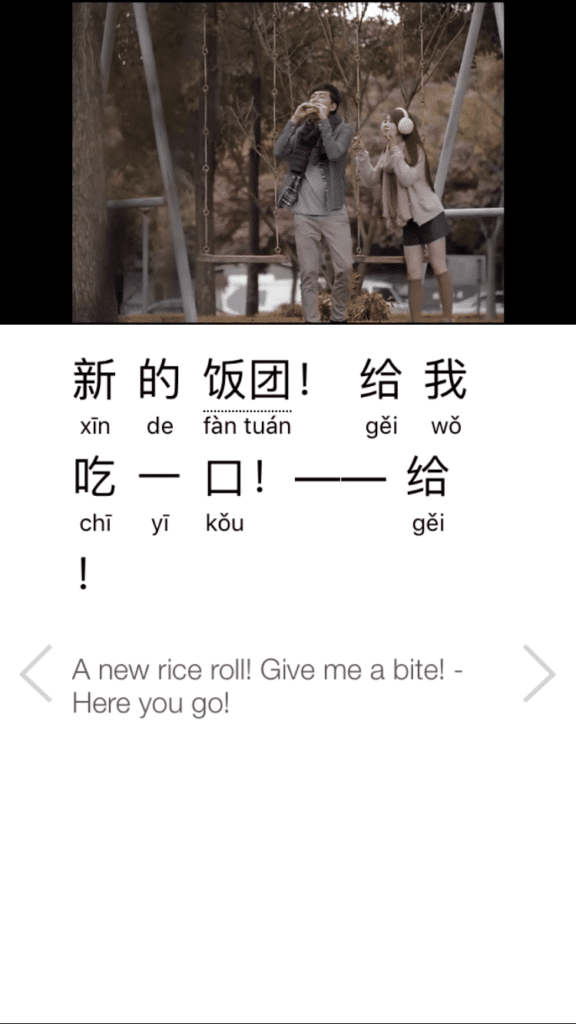There are many surprises in store for you when it comes to learning Chinese.
But this list below may hold the biggest surprise yet…
Thanks to your knowledge of English, you already know Chinese!
Did you know that many words commonly used in English are originally of Chinese origin?
What English Words Come from Chinese?
A language student may think, “It’s impossible to learn all these Chinese words!” But what if you were told that there are quite a few Chinese words used in English that you already know?
Yes, it’s true. Have you ever eaten tofu? Or, do you drink orange pekoe tea?
Perhaps you love dogs, or own a Shih Tzu puppy. Perhaps you live in an area that is susceptible to typhoons.
And you never would’ve guessed it—but ketchup is a word from Chinese as well!
I don’t know about you, but I’m feeling pretty gung-ho to learn more Chinese words used in English.
Building a stronger connection to Mandarin Chinese will help you take better advantage of all the free language learning resources available online. You might be compelled to get hooked on an addictive TV drama, or discover that cultural holidays and festivities hold many opportunities to further your studies.
Let’s get started!
27 Chinese Words Used in English That You Already Know
—Food and Eating—
1. pekoe
Pekoe is a popular type of tea, typically produced in Sri Lanka and India. The name comes from a Chinese dialect called Amoy, spoken in Xiamen, China, in which the tea is called pek-ho. In Mandarin, it’s 白后 (bái hòu), which means “white empress.” The name refers to the downy tips of young buds from the tea plant.
2. bok choy
Bok choy, a leafy green vegetable with white stems, can be found at Chinese stores or general grocery stores. It’s a common ingredient in Asian cuisine. The word comes from 白菜 (bái cài), meaning “white vegetable.”
3. chop suey
Chop suey is a mixed-vegetable dish you can order at Chinese restaurants. It comes from 杂碎 (zá suì), meaning “mixed pieces.” For example, you might see “pork chop suey” or “vegetable chop suey” listed on a menu.
4. dim sum
Dim sum are small, appetizer-like dishes of food, served for brunch at Chinese restaurants. There are a large variety of dim sum, including meat dishes, vegetarian dishes, cakes and pastries. Dim sum comes from 点心 (diǎn xīn). It translates literally as “touch the heart,” perhaps because of the dishes’ small, attractive quality.
5. ginseng
Ginseng is a herbal root used for tea and naturopathic medicine. It comes from 人参 (rén shēn). Ginseng is known to have many health benefits, including boosting circulation, lowering cholesterol and reducing stress.
6. loquat
Loquat is a yellow, plum-like fruit native to China and Japan, sometimes called Japanese plum. The name comes from a word in Cantonese, luh kwat, literally meaning “rush orange.” In Mandarin, it’s 芦橘 (lú jú).
7. won ton
Won ton are Chinese meat-filled dumplings, usually served in soup, sometimes accompanied by noodles. The name is from 馄饨 (hún tún), meaning “irregular pasta.”
8. wok
A wok is a stir-fry pan used for cooking. The word comes from Cantonese wohk, meaning “pan.” Its equivalent in Mandarin is 锅 (guō).
9. hoisin sauce
Hoisin sauce is a dark-colored, savory condiment with consistency like ketchup. It’s also called oyster sauce. It comes from 海鲜酱 (hǎi xiān jiàng), literally, “seafood sauce,” because it traditionally includes oyster essence or flavor.
10. ketchup
Would you have guessed that America’s favorite condiment comes from a Chinese word? Yup—it’s from the Hokkien Chinese term kê-tsiap, and it was originally a sauce made from fermented fish. Europeans tried to replicate it and later added tomato as a key ingredient. In Mandarin, ketchup is 番茄酱 (fān qié jiàng), or “tomato sauce.”
11. chow
Chow refers to food, and “chow down” means to eat. The term is Chinese-English pidgin, and dates back to the 1800s, when Chinese laborers developed railroads in California. There are different stories on this word’s origin. One explanation is that it comes from the Chinese word for “stir fry,” 炒 (chǎo).
12. kung pao
Have you ever had kung pao chicken? Kung pao chicken is a type of Chinese dish. This spicy dish originates from Sichuan Province (southwestern China) and traditionally uses Sichuan peppercorns.
In Mandarin, it’s called 宫保鸡丁 (gōng bǎo jī dīng). 宫保(gōng bǎo) means “palace guard.” Legend has it that this dish was the favorite of a famous palace guard in ancient China.
13. tofu
Tofu is soy bean curd. It comes directly from its Chinese name, 豆腐 (dòu fǔ).
14. lychee
Lychee is a tropical fruit with characteristically red shells and sweet, white flesh. Lychee is also used to flavor other foods like tea. In Chinese, it’s 荔枝 (lì zhī).
—Culture and Sayings—
15. kung fu
Kung fu, or Chinese martial arts, has been made famous by Hollywood movies and movie stars like Bruce Lee and Jackie Chan. The word comes from 功夫 (gōng fū).
16. coolie
A coolie is a laborer. The term comes from European colonialism and the practice of importing cheap labor from China and India. In Chinese it’s 苦力 (kǔ lì), or literally, “bitter work.”
17. gung-ho
Gung-ho means to show enthusiasm. It comes from the name for Chinese industrial cooperatives, 工合 (gōng hé), which means “work together.”
In 1942, US Marine Corps Lieutenant Evans Carlson saw and admired the work ethic of these organizations and decided to take the phrase back to America as an unofficial slogan for the Marines.
18. tai chi
Tai chi is a slow, meditative martial arts exercise. It comes from the Chinese name for this practice, 太极拳 (tài jí quán), or “shadow boxing.”
19. yin and yang
In Taoist philosophy, yin and yang represent two balancing forces in the universe. Yin is the dark force, and represents feminine quality. Yang is the light force, and represents masculine quality. The harmony of ying and yang is thought to balance the universe and influence everything in it. It comes from the Chinese term 阴阳 (yīn yáng).
20. mahjong
Mahjong is a Chinese gambling game. It comes from both Cantonese màhjéuk and the Mandarin 麻雀 (má què), which literally mean “sparrow.” A sparrow is often pictured on the first tile of a playing set. Mahjong is also phonetically identical to the game’s name in Chinese, which is 麻将 (má jiāng).
21. cheongsam
Cheongsam is a traditional robe for men. It is still worn at weddings or during Chinese New Year. The word comes from Cantonese chèuhngsāam, equivalent to Mandarin’s 长衫 (cháng shān) or “long dress.”
22. qipao
Qipao is a form-fitting traditional dress for women. The Chinese name is 旗袍 (qí páo).
23. feng shui
The practice of feng shui is thought to balance the energies in the environment and bring about good fortune. It comes from Chinese 风水 (fēng shuǐ), meaning “natural surroundings” or literally “wind and water.”
24. typhoon
A typhoon is a hurricane. The term comes from the Chinese equivalent, 台风 (tái fēng).
25. Shar Pei
Shar Pei is a breed of dog with characteristically brown, wrinkly skin and a blue-black tongue. Its name comes from 沙皮 (shāpí), meaning “sandy skin.”
26. Shih Tzu
Shih Tzu is a Tibetan dog breed with a long silky coat. It comes from 西施犬 (xī shī quǎn).
27. chop chop
Last but not least, the famous phrase for “hurry up!” Chop chop comes from the Cantonese word, gāp, which in Mandarin is 急 (jí). Both mean “in a rush.”
More Fun and Interesting Chinese Vocabulary
There you have it! Twenty-seven English words from Chinese that you already knew. Isn’t it nice to know that you’ve got 27 freebies in your Chinese learning vocabulary list?
But don’t stop there. Learning Chinese can be just as easy as going through this short list.
FluentU has more fun and entertaining tools for learning Chinese. Tools like real-world music videos, films and commercials that are adapted into Chinese lessons.
Each video has Chinese and English captions, and if you hover your cursor over any Chinese character, the definition and pronunciation is given. There are active learning tools for learners at every skill level.
Best of all, the program tracks all your language learning progress, so you’ll know exactly what materials you’ve covered and what you still have to learn.
Maybe you’ll even get a chance to see some of your new freebie Chinese words in action, used by Chinese natives!
And One More Thing…
If you enjoyed the fun cultural tidbits in this post, then you’ll love learning authentic Chinese with FluentU.
FluentU lets you learn real Chinese from music videos, commercials, news and inspiring talks. It naturally eases you into learning Chinese language, and you’ll learn Chinese as it’s spoken in real life.
FluentU has a wide range of contemporary videos—like dramas, TV shows, commercials and music videos. In fact, below you’ll even see the song “Let It Go” from the hit movie “Frozen”:
FluentU brings these native Chinese videos within reach via interactive captions. You can tap on any word to instantly look it up. All words have carefully written definitions and examples that will help you understand how a word is used. Tap to add words you’d like to review to a vocab list.
From the description page, you can access interactive transcripts under the Dialogue tab, or review words and phrases under Vocab.
https://www.fluentu.com/blog/chinese/2016/02/29/chinese-words-used-in-english/










